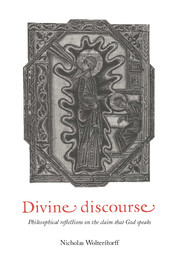Book contents
- Frontmatter
- Contents
- Preface
- 1 Locating our topic
- 2 Speaking is not revealing
- 3 The many modes of discourse
- 4 Divine discourse in the hands of theologians
- 5 What it is to speak
- 6 Could God have and acquire the rights and duties of a speaker?
- 7 Can God cause the events generative of discourse?
- 8 In defense of authorial-discourse interpretation: contra Ricoeur
- 9 In defense of authorial-discourse interpretation: contra Derrida
- 10 Performance interpretation
- 11 Interpreting the mediating human discourse: the first hermeneutic
- 12 Interpreting for the mediated divine discourse: the second hermeneutic
- 13 Has Scripture become a wax nose?
- 14 The illocutionary stance of biblical narrative
- 15 Are we entitled?
- 16 Historical and theological afterword
- Notes
- Index
9 - In defense of authorial-discourse interpretation: contra Derrida
Published online by Cambridge University Press: 01 June 2011
- Frontmatter
- Contents
- Preface
- 1 Locating our topic
- 2 Speaking is not revealing
- 3 The many modes of discourse
- 4 Divine discourse in the hands of theologians
- 5 What it is to speak
- 6 Could God have and acquire the rights and duties of a speaker?
- 7 Can God cause the events generative of discourse?
- 8 In defense of authorial-discourse interpretation: contra Ricoeur
- 9 In defense of authorial-discourse interpretation: contra Derrida
- 10 Performance interpretation
- 11 Interpreting the mediating human discourse: the first hermeneutic
- 12 Interpreting for the mediated divine discourse: the second hermeneutic
- 13 Has Scripture become a wax nose?
- 14 The illocutionary stance of biblical narrative
- 15 Are we entitled?
- 16 Historical and theological afterword
- Notes
- Index
Summary
Our scrutiny, in the last chapter, of Ricoeur's theory of interpretation, eventually revealed that his advocacy of textual sense interpretation, for interpreting texts at a distance, was not based, strictly speaking, on a rejection of authorial-discourse interpretation, but rather on the claim that to discover the sense of the text just is to discover the content and stance of the authorial-discourse; those have been fully incarnated in the sense. It was, strictly speaking, an argument against the autonomy of authorial-discourse interpretation. And my argument in response was that the content and stance of discourse cannot, in general, be inferred from the meaning of the sentences per se and their linguistic context. But if Ricoeur's attack was thus not truly radical, a truly radical attack on authorial-discourse interpretation is waiting in the wings; namely, that of Jacques Derrida. Derrida contends that authorial discourse interpretation is untenable because the very notion of authorial discourse is untenable. Not only is Derrida's attack thus more radical; for many readers today, it is also, more compelling. So if for no other reason than its massive appeal, we must consider what he has to say.
Let me say at the outset that it will be authorial-discourse interpretation that I will apply to Derrida's own text; I will try to find out what he was saying and then to state (some of that) in my own words.
- Type
- Chapter
- Information
- Divine DiscoursePhilosophical Reflections on the Claim that God Speaks, pp. 153 - 170Publisher: Cambridge University PressPrint publication year: 1995



